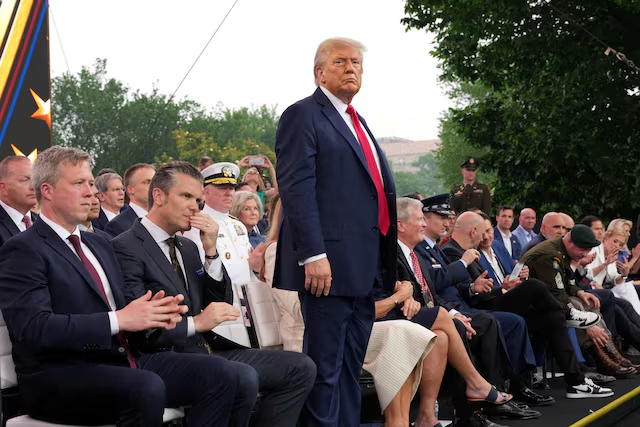On June 15, 2025, the Middle East teetered on the edge of a broader conflict as Israel and Iran launched devastating attacks on each other, killing scores and raising global alarm. The violence, which intensified overnight into Sunday, has left cities in ruins, civilians dead, and oil prices soaring, while U.S. President Donald Trump insists he can “easily” broker peace between the two nations.
A Surge of Violence
Israel’s “Operation Rising Lion,” launched on Friday, caught Iran off guard, targeting its top military leaders and damaging nuclear facilities. The Israeli military continued its offensive, striking “dual-use” fuel sites that support Iran’s military and nuclear programs, including a major oil depot in Tehran and facilities at the South Pars gas field, the world’s largest. These attacks lit up the night sky and disrupted Iran’s energy infrastructure, critical to its economy and military operations. Israel warned Iranians near weapons facilities to evacuate, signaling more strikes to come. Prime Minister Benjamin Netanyahu, speaking from a balcony overlooking the wreckage of apartments in Bat Yam, vowed that Iran would “pay a heavy price” for civilian deaths.
Iran retaliated with waves of ballistic missiles, firing 270 over two nights, 22 of which breached Israel’s advanced anti-missile defenses. The attacks flattened a 14-story apartment block in Tehran, killing 60 people, half of them children, and struck residential areas in Israel, including Bat Yam, where six died. In total, Iran reported 78 deaths on Friday and more since, while Israel’s toll reached 13, including 10 from a missile strike on apartments in Bat Yam. Rescue teams in both countries worked frantically, using sniffer dogs and excavators to search for survivors amidst the rubble.
Global Stakes and Economic Ripples
The strikes on Iran’s oil and gas sector sent oil prices skyrocketing by 9% on Friday, with markets bracing for further volatility when trading resumes on Monday. While Israel has so far avoided targeting Iran’s oil export facilities, the attacks on domestic energy infrastructure threaten global energy stability. Iran has hinted at disrupting Gulf shipping but has not yet acted, leaving traders and analysts on edge. Meanwhile, Iran urged citizens to seek shelter in mosques, schools, and subways, while Israel’s air raid sirens sent millions into bomb shelters in cities like Jerusalem, Haifa, and Tel Aviv.
Trump’s Bold Claims
Amid the chaos, President Trump took to Truth Social, warning Iran against attacking U.S. targets and threatening overwhelming retaliation if they did. At the same time, he expressed optimism about ending the conflict, claiming that “many calls and meetings” were underway and that peace could come “soon.” In an ABC News interview, Trump suggested that Israel’s strikes might push Iran to negotiate faster, even proposing that Russia’s Vladimir Putin could mediate. However, scheduled nuclear talks between the U.S. and Iran in Oman were canceled due to the ongoing attacks, casting doubt on immediate diplomatic progress.
Trump’s assertion that he could “easily” resolve the conflict contrasts sharply with the escalating violence and statements from Israeli and Iranian leaders. Netanyahu promised to intensify Israel’s campaign, while Iran’s President Masoud Pezeshkian vowed “more decisive and severe” responses if Israel continues its attacks. Trump’s claims also drew skepticism given the collapse of Iran’s regional proxies, like Hamas and Hezbollah, which have been weakened by prior conflicts, limiting Iran’s retaliation options.
A Region on Edge
The conflict’s rapid escalation has sparked fears of a wider war, with Israel’s strikes on Iran’s nuclear and military infrastructure raising the stakes. The United Nations reported Iran increasing its stockpiles of near weapons-grade uranium, fueling Western concerns about its nuclear ambitions. Israel’s Defense Minister Israel Katz vowed to “peel the skin off the Iranian snake,” targeting its nuclear capabilities and weapons systems. Meanwhile, Iran’s U.N. ambassador condemned Israeli strikes on civilian areas, and the country’s foreign ministry decried the humanitarian toll.
As sirens blare and missiles streak across the skies, the human cost is mounting. Families in both nations are grieving, and the world watches anxiously, hoping for de-escalation. Whether Trump’s optimistic promises of peace can materialize amid such destruction remains uncertain, but for now, the region braces for what may come next.
